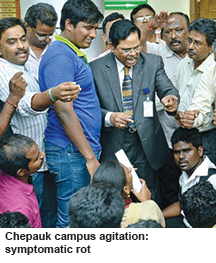Perhaps for the first time in the history of post-independence India, the Union Budget 2015-16 has reduced the Central government’s outlay for education from Rs.82,771 crore in 2014-15 to Rs.69,074 crore in the current year. The rationale advanced for this shocking neglect of the world’s largest population of children and youth is that with the 14th Finance Commission having awarded the states a significantly higher proportion (42 from 32 percent) of the Centre’s tax revenue, state governments will increase their education outlays.
 The steady decline of the state government-funded University of Madras (UoM, estb.1857)belies this myopic rationalisation. During the past 157 years, the state government-managed UoM, which has 132 colleges affiliated with it and an aggregate enrolment of over 200,000 students, should have matured into a globally respected varsity. Instead, it has suffered continuous devaluation and is better known for its scandals, caste-based clashes and student unrest, than for academic excellence.
The steady decline of the state government-funded University of Madras (UoM, estb.1857)belies this myopic rationalisation. During the past 157 years, the state government-managed UoM, which has 132 colleges affiliated with it and an aggregate enrolment of over 200,000 students, should have matured into a globally respected varsity. Instead, it has suffered continuous devaluation and is better known for its scandals, caste-based clashes and student unrest, than for academic excellence.
On March 3, over 200 postgraduate and research students from the university’s 68 departments staged a protest at UoM’s Chepauk campus, demanding drinking water and sanitation facilities, maintenance of books in the library and faster internet access. “There is no water supply in the universities’ washrooms nor do we have safe drinking water. Instead, we have been advised to carry our own water bottles. Although we pay an annual fee of Rs. 8,000, our classrooms are small and dingy with poor ventilation. The university staff and faculty have no respect for students and are deaf to our demands for basic facilities,” says a human resource management postgraduate student.
According to UoM insiders, the poor infrastructure of the Chepauk main campus which grudgingly hosts 1,356 postgraduate students, 75 full-time research scholars and over 216 faculty members, is symptomatic of the rot in all its six campuses and in a great majority of affiliated colleges. Although it was nominated as a ‘university with potential for excellence’ by the Delhi-based University Grants Commission (UGC) in 2011, and was awarded a Rs.25 crore grant for improving the infrastructure facilities of its 68 departments, 18 schools and 52 research institutions, there’s little to show for it. Instead in January, UGC vice chairman H. Devaraj, accused three former UoM vice chancellors of banking the grant award instead of utilising it.
Although it’s politically incorrect to say so, it’s quite clear the decline of UoM is intimately connected with caste-based reservations in public administration and academia which successive state governments have championed for four decades.
Even though in 1990, the Supreme Court imposed a ceiling of 49.5 percent on reservations, it’s common knowledge that in Tamil Nadu, upto 69 percent of faculty positions and student admissions are awarded on caste considerations. Consequently, caste consciousness and caste-based politics is rampant on UoM campuses.
With students from historically underprivileged castes/classes constituting a majority, there’s stiff resistance to tuition fee increases. When this correspondent requested information on the annual budget of UoM and the contribution of students’ tuition fees to it by email, the UoM registrar declined to respond.
Simultaneously, exam malpractices are rampant in UoM and its affiliated colleges. “Caste-based politics is at the root of recurring malpractices in the university. Moreover, a lot of money is siphoned in and out of the university with no action taken against offenders,” says a former professor of Madras University, speaking on condition of anonymity.
Unsurprisingly, faculty associations allege political favouritism in appointing UoM vice chancellors. They highlight that 60 percent of faculty posts are vacant because well-qualified academics are unwilling to endure the caste wars, poor pay and general indiscipline in Tamil Nadu’s state government-funded institutions of higher education.
With deep discontent brewing among students, faculty and university authorities, the panacea for the ills of UoM and all state government-funded/managed institutions of higher education in Tamil Nadu — a state respected for its excellent academic output — is greater Central supervision and intervention in the interests of standardisation and improved learning outcomes.
But with greater autonomy proposed to be devolved upon state governments to shape and manage education policies and institutions by the BJP-NDA government at the Centre, that prescription is destined for the wastepaper basket.
Hemalatha Raghupathi (Chennai)


























